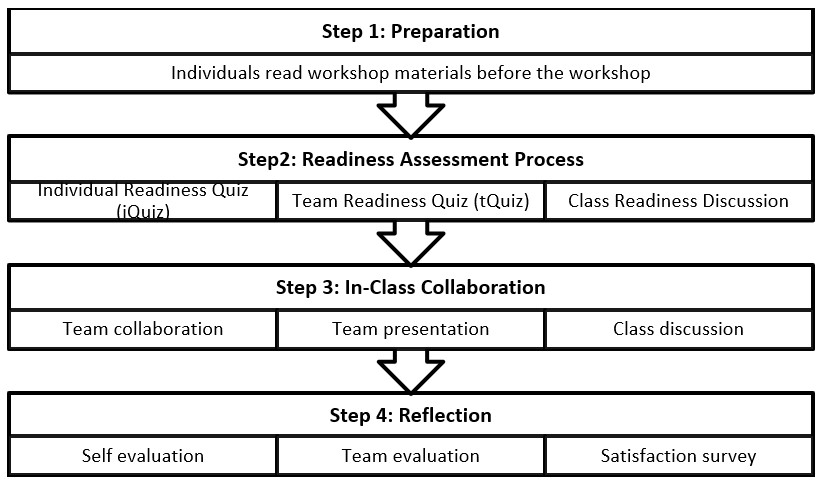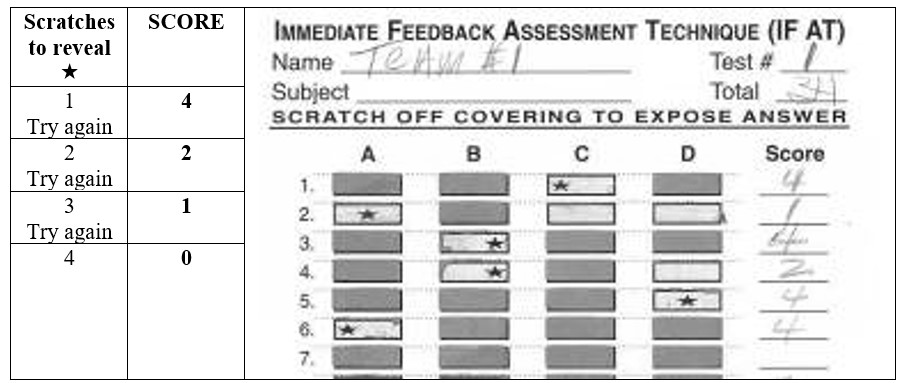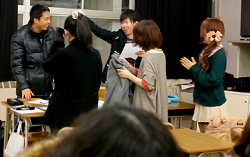The Game Board
We will use a game metaphor to guide our activities to enhance performance and satisfaction at the individual, team, and classroom levels. The game will involve four key steps in each workshop (Michaelsen, Knight, & Fink, 2002) [See Table 1]:
- Preparation
- Readiness Assessment Process
- In-class Collaboration
- Reflection

Step 1: Preparation
You will prepare for each workshop by reading the workshop materials. Make sure you read the materials carefully. The activities during the workshop will be based on your readings. The better you prepare, the more you can contribute to your team and classroom activities during the workshop.
Step 2: Readiness Assessment Process
The Readiness Assessment Process aims to help you and your team members build the knowledge you will use to solve problems in Step 3, In-class Collaboration. The Readiness Assessment Process consists of three steps: (1) Individual Readiness Quiz (iQuiz), (2) Team Readiness Quiz (tQuiz), and (3) Class Readiness Exchange. (hanashiai, giron [discussion]
Individual Quiz (iQuiz)
Individual accountability is a basic characteristic of successful teams. To help individual students prepare for participating in teamwork, each student will take an individual Readiness Assessment Quiz (iQuiz) at the start of every workshop. The iQuiz measures your comprehension of the workshop readings. You may also notice that the quiz helps to deepen your understanding of the workshop material. This will help you better prepare to participate in team and class activities. The points for the iQuiz will be as follows:
- Each quiz will have 10 multiple-choice questions related to material in the workshop readings.
- Each correct answer will earn four points; each quiz is worth up to 40 points.
- Your score for the iQuiz will be added to your total individual score and your team’s total score.
- Only you will know your score. However, it is crucial to understand that your preparation for each workshop will benefit you and your team.
Team Quiz (tQuiz)
Following the iQuiz, you will join with a group of other students to take a team Readiness Assessment Quiz (tQuiz), as follows:
- As a team, you will talk about each question on the tQuiz to build a consensus about the correct answers. Each team member should participate in the conversation.
- Once you have developed a consensus, your team will mark its answer by scratching the coating on the answer sheet [See “Scoring the tQuiz].
- When you have answered all the questions, tally your score on the IF-AT form and turn it into the instructor [See “Scoring the tQuiz”].
Increasing individual and team effectiveness during tQuiz. To increase success for you and your team, make sure that you prepare by reading the workshop materials and fully participating in team conversations and activities. Individuals should put aside reserve and demonstrate mutual respect to enhance team effectiveness. Your instructor will observe your group’s activities to assess the quality of your collaboration. During the tQuiz the teacher will evaluate each team member based on four variables:
- Did each individual contribute to the team conversation?
- Did the team contribute to the development of each individual during the conversations?
- What was the score the team earned on the tQuiz?
- What was the combined score of the team member iQuiz results?
Feedback and class conversation
Following the quizzes, the instructor will explain complex concepts and answer questions that individuals and teams have about the content in the workshop reading materials. The combination of teamwork and classroom conversation will help enrich your understanding of the concepts necessary so you can fully participate in Step 3, In-Class Collaboration. This feedback will deliver a key benefit of teamwork: Even when we struggle as individuals, collaborating with our team members and classmates can help us to develop understanding and abilities that exceed those we develop on our own (Ancona & Chong, 1994).

Step 3: In-Class Collaboration
During Step 3, your team members will collaborate to develop a simple project that applies your new knowledge to answer a question or to solve a problem. The teams will then share their answers or solutions with the other teams in the class. For example, during the first workshop, you will do the following:
- Join a group of other students to form a team [the instructor will form the teams]
- Decide on a team name and mascot
- Identify shared goals
- Develop rules for successful teamwork
- Present your team to the rest of the class during a five-minute presentation
Do not worry; everyone will be nervous. But, by working together as a team and as a class, we will develop the knowledge, skills, and confidence we need to be successful at school and work.
Step 4: Reflection
Learning from mistakes and building on success are keys to effective teamwork (University of Phoenix, 2004). This requires that individuals reflect on individual and team performance to identify areas for improvement. At the end of each workshop, the teams will spend a few minutes discussing how to build on their success and overcome challenges.
The team members will privately complete a Workshop Evaluation Form [See “Workshop Evaluation Form” in Appendix]. The Workshop Evaluation Form will help you reflect on each team member's performance and contributions. The form will also allow you to reflect on their performance and satisfaction and allow you to make suggestions for improving classroom activities.





![Your brain can keep growing, adapting, and learning at any age, if you are willing to put in the effort [Image: Copilot]](/images/Images/best-years-for-adult-brain300.png)
